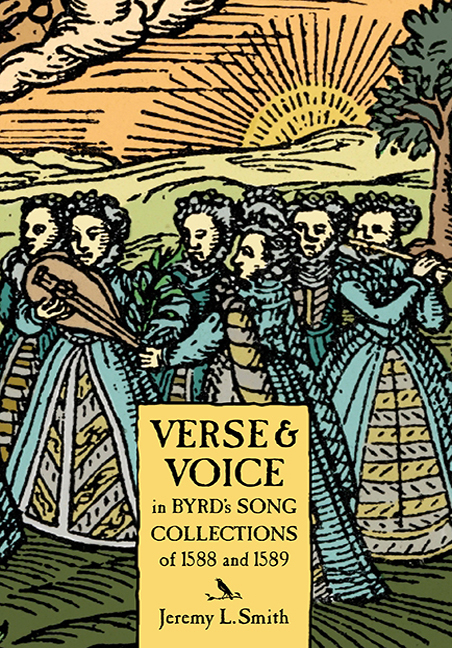Book contents
- Frontmatter
- Contents
- List of Figures
- List of Music Examples
- Preface and Acknowledgements
- Editorial Conventions
- Introduction
- CHAPTER 1 Psalmes
- CHAPTER 2 Sonets & Pastoralls, I
- CHAPTER 3 Sonets & Pastoralls, II
- CHAPTER 4 Sonets & Pastoralls, III
- CHAPTER 5 Songs of sadnes and pietie
- CHAPTER 6 Songs of Three Parts
- CHAPTER 7 Songs of Four Parts
- CHAPTER 8 Songs of Five Parts
- CHAPTER 9 Songs of Six Parts
- Conclusion
- Select Bibliography
- Index
- Studies in Medieval and Renaissance Music
CHAPTER 3 - Sonets & Pastoralls, II
Published online by Cambridge University Press: 05 July 2016
- Frontmatter
- Contents
- List of Figures
- List of Music Examples
- Preface and Acknowledgements
- Editorial Conventions
- Introduction
- CHAPTER 1 Psalmes
- CHAPTER 2 Sonets & Pastoralls, I
- CHAPTER 3 Sonets & Pastoralls, II
- CHAPTER 4 Sonets & Pastoralls, III
- CHAPTER 5 Songs of sadnes and pietie
- CHAPTER 6 Songs of Three Parts
- CHAPTER 7 Songs of Four Parts
- CHAPTER 8 Songs of Five Parts
- CHAPTER 9 Songs of Six Parts
- Conclusion
- Select Bibliography
- Index
- Studies in Medieval and Renaissance Music
Summary
THE four works of the “sonets” section on temperance, discussed in the previous chapter, form a clearly defined set that comes to a satisfying close, at least in terms of structure and narrative. Yet there are some issues evoked within them that would resonate into the next series. In the key poem of that earlier group, “Who likes to love” (BE 12: 13), Cupid was ousted from his throne because of his “love for golde” (l. 24). The gods then granted some women whom Cupid had abused a “longer day” (l. 21) to “devise” (i.e., decide, l. 22) who should take over his “bowe & shafts” (l. 19). As noted above, they gave them to a “mayden chast” (l. 27), who subsequently pierced the narrator's heart. As in Edmund Spenser's Faerie Queene, the term “chast” embodies here a broad concept of sexual purity within which virginity is but one form. But, virgin or not, the heroine of “Who likes” remains remote from the narrator, who only “see[s]” (l. 28) her. The female character herself is, perhaps not surprisingly, described as a “beaut[y] rare” (l. 31) but one who is also, more unusually, “[un]corrupt[ed]” by “golde” (l. 12).
Through allusion and inference, Byrd makes it clear that the unnamed figure should be seen as Queen Elizabeth at some level of interpretation. What this beautiful “mayden chast” also represents, and what will then become the subject of the following two sets of songs, I would contend, is pure aspiration, or ambition: and this was what made the image so important to her courtiers. Aspiration is the quality that reveals “Greatness of Soul,” although it seems to reside in a position somewhere between the virtues of magnanimity and magnificence. Magnanimity is a virtue that Aristotle cast as central or crowning. Spenser, however, had named magnificence as the chief virtue.3 Byrd, I believe, may have followed certain aspects of the Aristotelian tradition, but he ultimately hews more closely to the ideas of Spenser.
- Type
- Chapter
- Information
- Publisher: Boydell & BrewerPrint publication year: 2016



